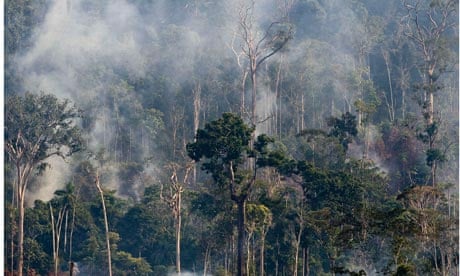Britain is spending £10m to tackle deforestation in Brazil in an effort to protect wildlife and reduce carbon emissions.
The environment secretary, Caroline Spelman, said the money would help farmers in Cerrado, central Brazil, restore natural habitats, reduce forest fires and ease the pressure for more deforestation to provide land for agriculture.
Speaking at the International Forest Day conference in Durban, South Africa, where the latest round of UN climate talks are being held, Spelman said: "The Cerrado is rich in biodiversity and yet, alarmingly, it has almost halved in size, because of wildfires and the demand for agricultural products.
"If we're going to stop the loss of biodiversity, we need to protect our forests, which house the majority of the world's wildlife. We won't succeed in tackling climate change unless we deal with deforestation."
The move comes as environmental groups warn that changes to Brazil's laws on protecting its forests, being voted on this week, will weaken them and make it hard for the country to meet its pledges to reduce carbon emissions. They say it will also undermine international efforts to reduce greenhouse gases from deforestation which are being discussed at the current UN talks.
According to the WWF wildlife charity, the changes to the forest code laws, which looks set to be approved by Brazil's senate this week, will provide an amnesty for illegal deforestation, which occurred by 2008, stop illegally deforested areas being fully restored and allow non-native species to be planted.
WWF says Brazilian government data shows that 79m hectares of forest in Brazil – an area the size of the UK and France combine – could be left unprotected and 29bn tonnes of carbon dioxide could be released into the atmosphere or not captured in restored forests as a result of the changes.
Carlos Rittl, climate change and energy programme co-ordinator at WWF-Brazil, said: "Brazil could go from being a global leader in reducing deforestation to potentially shooting up the list of the world's top greenhouse gas emitters."
Brazil's environment minister, Izabella Teixeira, said the country had been leading a consistent policy to reduce deforestation.
Brazil's success in cutting deforestation in the Amazon from 27,000 sq km in 2004 to 7,000 in 2010, had led the government to broaden work to other affected areas such as the Cerrado, which covers a quarter of the country, she said as she welcomed the UK's bilateral move.
The UK has pledged £2.9bn for projects to tackle climate change, with a significant proportion going to efforts to reduce emissions associated with deforestation, which comprise almost a fifth of annual global emissions.
